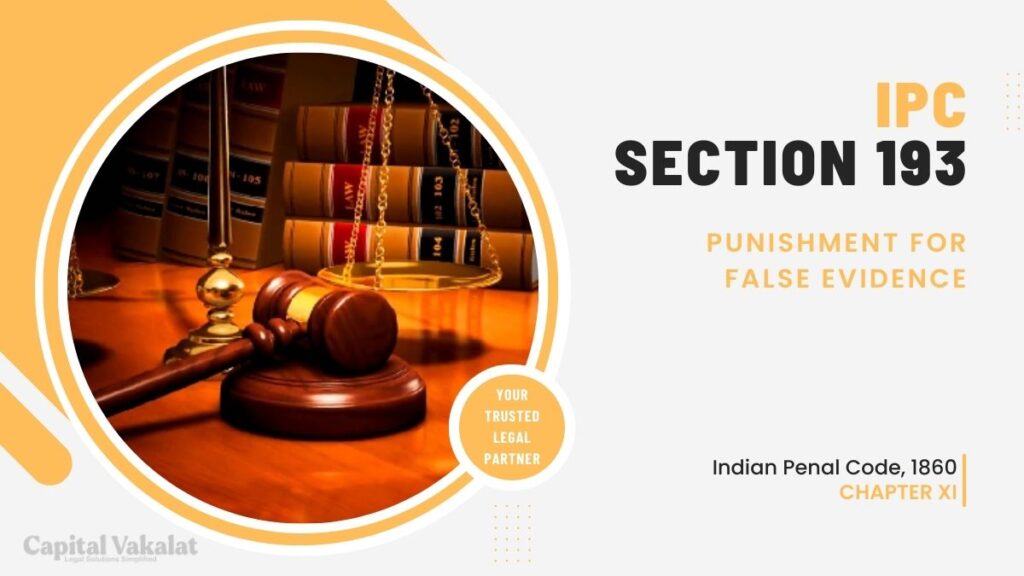In the realm of Indian criminal law, Section 193 of the Indian Penal Code (IPC) deals with the offense of giving false evidence during a judicial proceeding. This provision holds great significance in maintaining the integrity of the judicial system, ensuring that justice is served and upheld.

Let’s delve into the details of Section 193 IPC, exploring its elements, punishment, and its implications.
Understanding Section 193 IPC
Section 193 IPC addresses situations where individuals provide false evidence, leading to wrongful outcomes during legal proceedings. It encompasses a broad spectrum of actions aimed at deceiving the court or any public servant in their official capacity.
Elements of False Evidence
To comprehend this section fully, it is essential to break down its key elements:
1. Intent to Cause Wrongful Gain or Loss
The core of this offense lies in the intent. For a person to be charged under Section 193 IPC, they must possess the intent to cause wrongful gain or loss. This wrongful gain or loss may pertain to themselves or someone else.
2. Presentation of False Evidence
The accused must present false evidence or make false statements in the course of a judicial proceeding. This could involve fabricated documents, perjury, or any other form of dishonesty meant to mislead the court.
3. During a Judicial Proceeding
The offense occurs when false evidence is presented during a judicial proceeding, investigation, or inquiry. This can be in a court of law, before a magistrate, or any person authorized to administer an oath.
Punishment under Section 193 IPC
Now, let’s explore the penalties that one may face if convicted under Section 193 IPC:
1. Imprisonment
Individuals found guilty can face imprisonment, which may extend to seven years. The court has the discretion to determine the length of the sentence based on the severity of the offense.
2. Fine
In addition to imprisonment, the court may impose a fine on the offender. The fine amount varies and depends on the circumstances of the case.
Significance of the Section
Section 193 IPC plays a pivotal role in upholding the truth and ensuring the proper functioning of the judicial system. It discourages individuals from resorting to dishonest means and thereby, safeguards the interests of justice.
Landmark Cases
Over the years, Section 193 IPC has been invoked in several landmark cases to bring those guilty of providing false evidence to justice. These cases have set precedents and shaped the interpretation of this section.
Differences from Other Offenses
It is important to differentiate Section 193 IPC from other offenses like perjury and contempt of court, as each offense has its distinct elements and consequences.
Legal Defenses
In the face of allegations under Section 193 IPC, individuals may assert various legal defenses, such as:
1. Lack of Intent
Demonstrating that there was no intent to cause wrongful gain or loss can be a strong defense against charges under this section.
2. Absence of False Evidence
Proving that the evidence presented was not false can also be a valid defense in such cases.
Real-Life Implications
False evidence can lead to miscarriages of justice, damaging the lives of innocent individuals and eroding trust in the legal system. Section 193 IPC serves as a deterrent against such actions.
Impact on the Judicial System
The provision ensures that the judicial system functions smoothly, free from manipulation and deceit. It safeguards the principles of truth and justice.
Challenges in Prosecution
Prosecuting cases under Section 193 IPC can be challenging, as it demands a thorough examination of evidence and intent. The burden of proof lies on the prosecution.
Preventive Measures
To prevent false evidence, it is crucial to educate individuals about the legal consequences and ethical implications of their actions. Awareness campaigns and legal literacy can be effective tools in this regard.
Conclusion
Section 193 IPC is a significant provision in the Indian Penal Code that seeks to protect the integrity of the judicial system by penalizing those who present false evidence during legal proceedings. Upholding truth and justice is at the heart of this section, ensuring that the legal process is fair and unbiased.
Frequently Asked Questions
How can one be punished under this section?
Conviction under Section 193 IPC can result in imprisonment and a fine, the severity of which depends on the circumstances of the case.
Are there any notable cases related to Section 193 IPC?
Yes, several landmark cases have invoked this section, setting precedents for its interpretation.
Can lack of intent be a defense in a case under this section?
Yes, lack of intent to cause wrongful gain or loss can be a valid defense against charges under Section 193 IPC.
How does Section 193 IPC affect the justice system?
Section 193 IPC serves to maintain the integrity of the justice system by deterring individuals from presenting false evidence and thereby safeguarding the interests of justice.